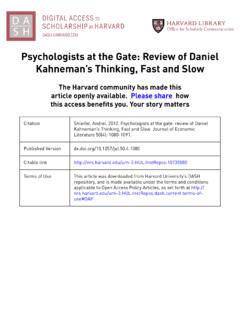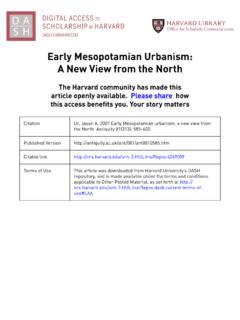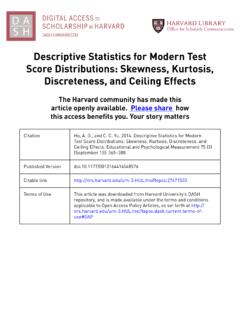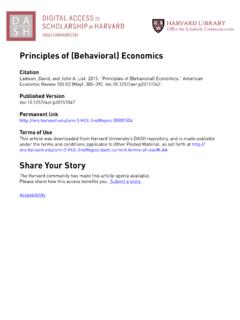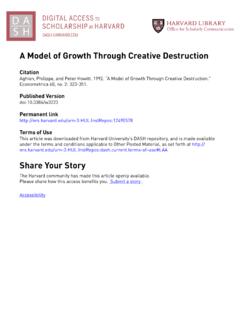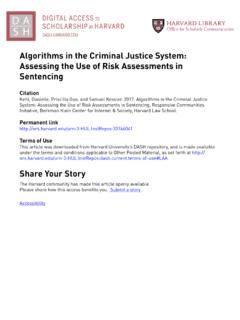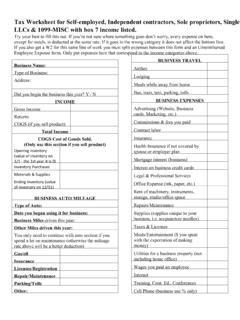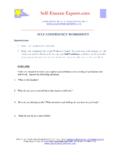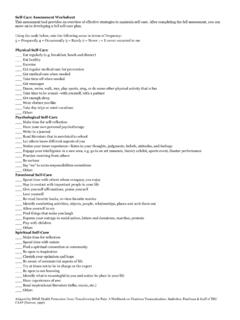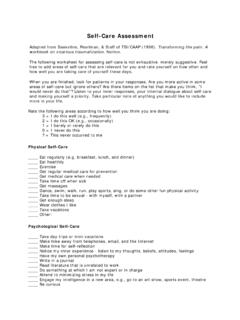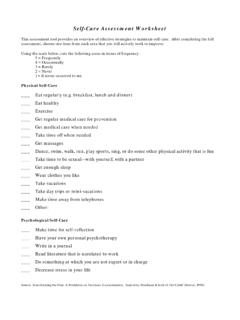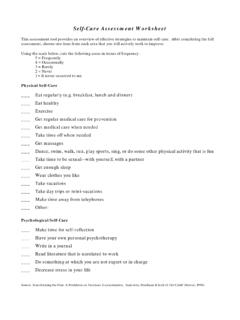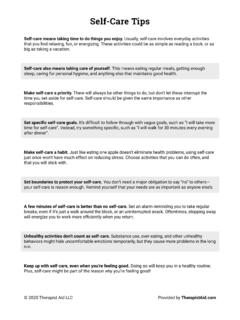Transcription of What Is Public Narrative: Self, Us & Now
1 What Is Public narrative : self , Us & NowCitationMarshall Ganz. 2009. What Is Public narrative : self , Us & Now ( Public narrative worksheet ). Working :30760283 Terms of UseThis article was downloaded from Harvard University s DASH repository, and is made available under the terms and conditions applicable to Other Posted Material, as set forth at #LAAS hare Your StoryThe Harvard community has made this article openly share how this access benefits you. Submit a story .Accessibility Public narrative worksheet In this worksheet you will focus primarily on your story of self . But Public narrative is not primarily a form of self -expression.
2 It is an exercise of leadership by motivating others to join you in action on behalf of a shared purpose. Although this worksheet focuses on your story of self , the goal is to identify sources of your own calling to the purpose in which you will call upon others (story of us) to join you in action (story of now). Remember, Public narrative requires learning a process, not writing a script. It can be learned only by telling, listening, reflecting, and telling again over, over and over. This is to get you started. 1. A story of now: What urgent challenge do you hope to inspire others to take action on?
3 What is your vision of successful action? What choice will you call on members of your community in this case, your classmates - to make if they are to meet this challenge successfully? How can they act together to achieve this outcome? And how can they begin now, at this moment? Describe this now in two or three sentences. 2. A story of us: To what values, experiences, or aspirations of your community in this case your classmates at the very least will you appeal when you call on them to join you in action? What stories do you share that can express these values? Describe this us in two or three sentences.
4 3. A story of self : Why were you called to motivate others to join you in this action? What stories can you share that will enable others to get you. How can you enable others to experience sources the values that move you not only to act, but to lead? Focus on this section, trying to identify key choice points that set you on your path. telling your Public narrative WHY STORIES? Stories are how we learn to make choices. Stories are how we learn to access the moral and emotional resources we need to face the uncertain, the unknown, and the unexpected mindfully. Because stories speak the language of emotion, the language of the heart, they teach us not only how we ought to act, but can in inspire us with the courage to act.
5 And because the sources of emotion on which they draw are in our values, our stories can help us translate our values into action. A plot begins when a protagonist moving toward a desired goal runs into an unexpected event, creating a crisis that engages our curiosity, choices he or she makes in response, and an outcome. Our ability to empathetically identify with a protagonist allows us to enter into the story, feel what s/he feels, see things through his or her eyes. The moral, revealed through the resolution, brings understanding of the head and of the heart. Stories teach us how to access moral resources to face difficult choices, unfamiliar situations, and uncertain outcomes.
6 Each of us is the protagonist in our own life story; we face everyday challenges, we author our own choices, and we learn from the outcomes the narrative of which constitutes who we are, our identity By telling personal stories of challenges we have faced, choices we have made, and what we learned from the outcomes, we become more mindful of our own moral resources and, at the same time, share our wisdom so as to inspire others. Because stories enable us to communicate our values not as abstract principles, but as lived experience, they have the power to move others. Stories are specific and visual - they evoke a very particular time, place, setting, mood, color, sound, texture, taste.
7 The more you can communicate this visual specificity, the more power your story will have to engage others. This may seem like a paradox, but like a poem or a painting or a piece of music, it is the specificity of the experience that can give us access to the universal sentiment or insight they contain. You may think that your story doesn t matter, that people aren t interested, that you shouldn t be talking about yourself. But when you do Public work, you have a responsibility to offer a Public account of who you are, why you do what you do, and where you hope to lead. If you don t author your Public story, others will, and they may not tell it in the way that you like.
8 A good story Public story is drawn from the series of choice points that have structured the plot of your life the challenges you faced, choices you made, and outcomes you experienced. Challenge: Why did you feel it was a challenge? What was so challenging about it? Why was it your challenge? Choice: Why did you make the choice you did? Where did you get the courage or not? Where did you get the hope or not? How did it feel? Outcome: How did the outcome feel? Why did it feel that way? What did it teach you? What do you want to teach us? How do you want us to feel? The story you tell of why you have chosen the path you have allows others emotional and intellectual insight into your values, why you have chosen to act on them in this way, what they can expect from you, and what they can learn from you.
9 Story of now WHAT URGENT CHALLENGE MIGHT YOU CALL ON US TO FACE? WHAT VISION COULD WE ACHIEVE IF WE ACT? WHAT ACTION MIGHT YOU CALL UPON US TO JOIN YOU IN TAKING? PLEASE RESPOND WITH NO MORE THAN 2-3 SENTENCES. A story of now is urgent, an urgency based on threat, or, equally, on opportunity; it is meant to inspire others to drop other things and pay attention; it is rooted in the values you celebrate in your story of self and us, but poses a challenge to those values. It contrasts a vision of the world as it will be if we fail to act, the world as it could be if we do act, and calls on us to act. Do you value honoring those who sacrifice for their country?
10 Does the care returning veterans receive meet this standard? If not, what are you going to do about it? Do you value passing on a livable world to the next generation? Do the measures being taken to deal with climate change meet this standard? If not, what are you going to do about it? Do you value a society in which individuals are only responsible for themselves and their families? Is being undermined by Public policies, interest groups and others? What are you going to do about it? Do you value the principal that powerful institutions, especially If they benefit from Public support, have moral responsibilities to the Public in how they use their power?
